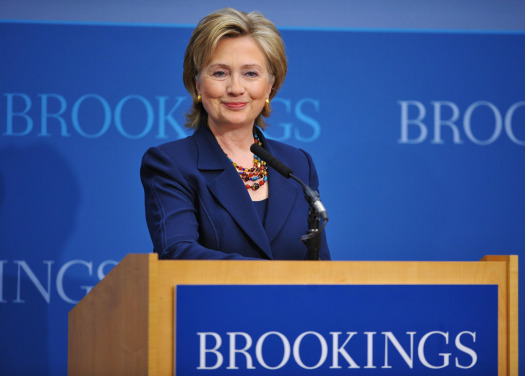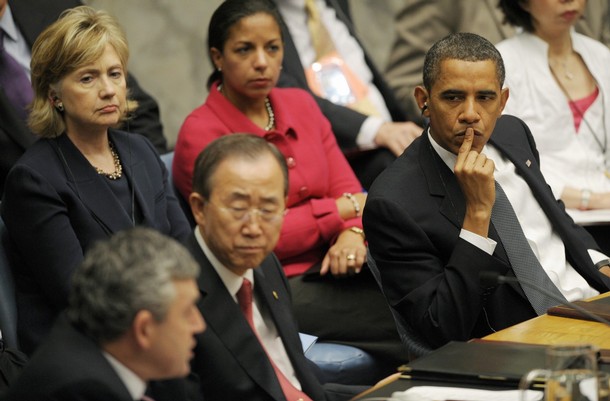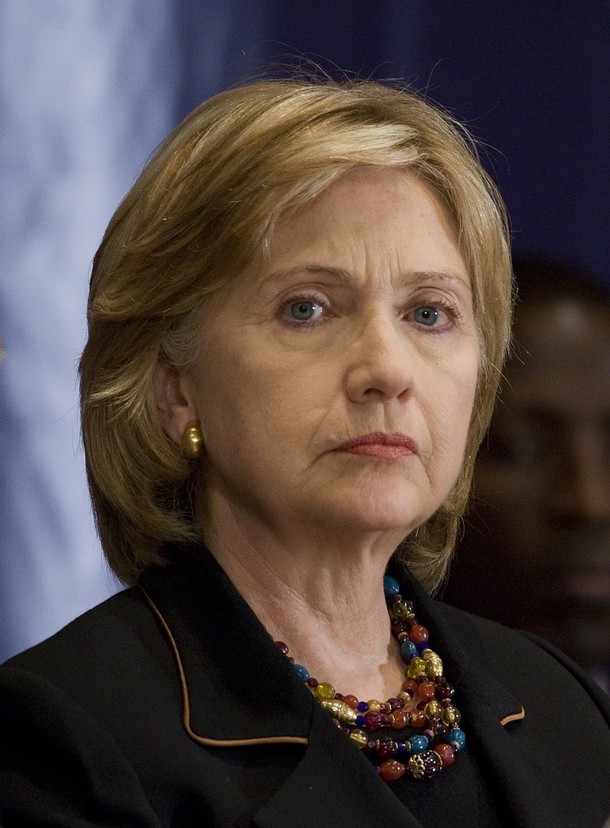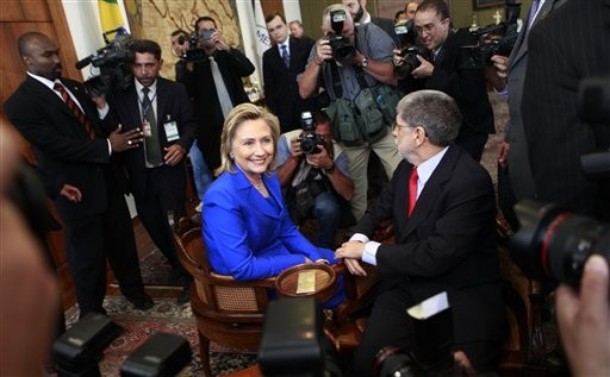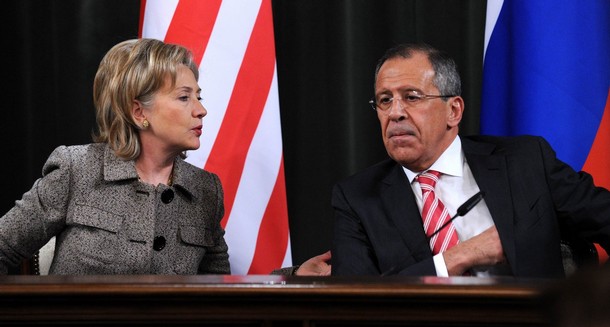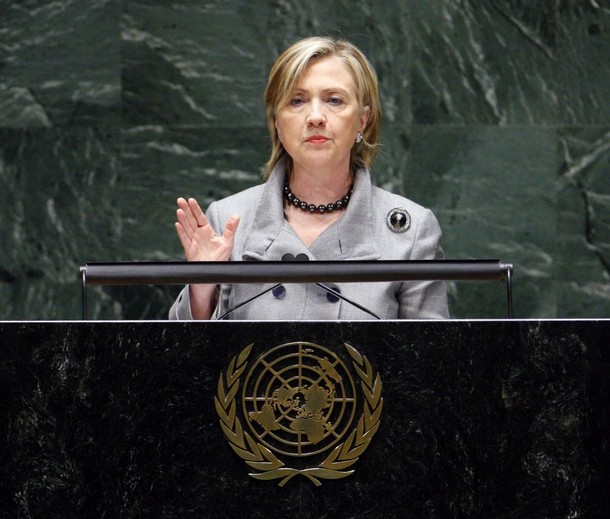
Hillary provides a brief history of U.S.-Iranian relations from the coup in 1953 that installed the Shah through his overthrow in 1979 and the seizure of Embassy Tehran that year in which 52 Americans were taken hostage and held for 444 days until after Ronald Reagan took the oath of office on January 20, 1980. (OK - Hillary doesn't say that, but I will never forget it.)
She enumerates terrorist attacks originating in or connected to the new Iranian revolution over the decades that indicate the global danger posed by a nuclear Iran which refused to abide by the Nuclear Nonproliferation Treaty (which it had signed) and denied inspection access to the International Atomic Energy Agency (IAEA).
Hillary began advocating for sanctions against Iran as Senator from New York. During the 2008 primaries she took issue with Obama's plan to engage directly with Iran without preconditions. She also threatened nuclear retaliation if Iran were to launch a nuclear attack on Israel and Iran filed a formal protest against her at the U.N.
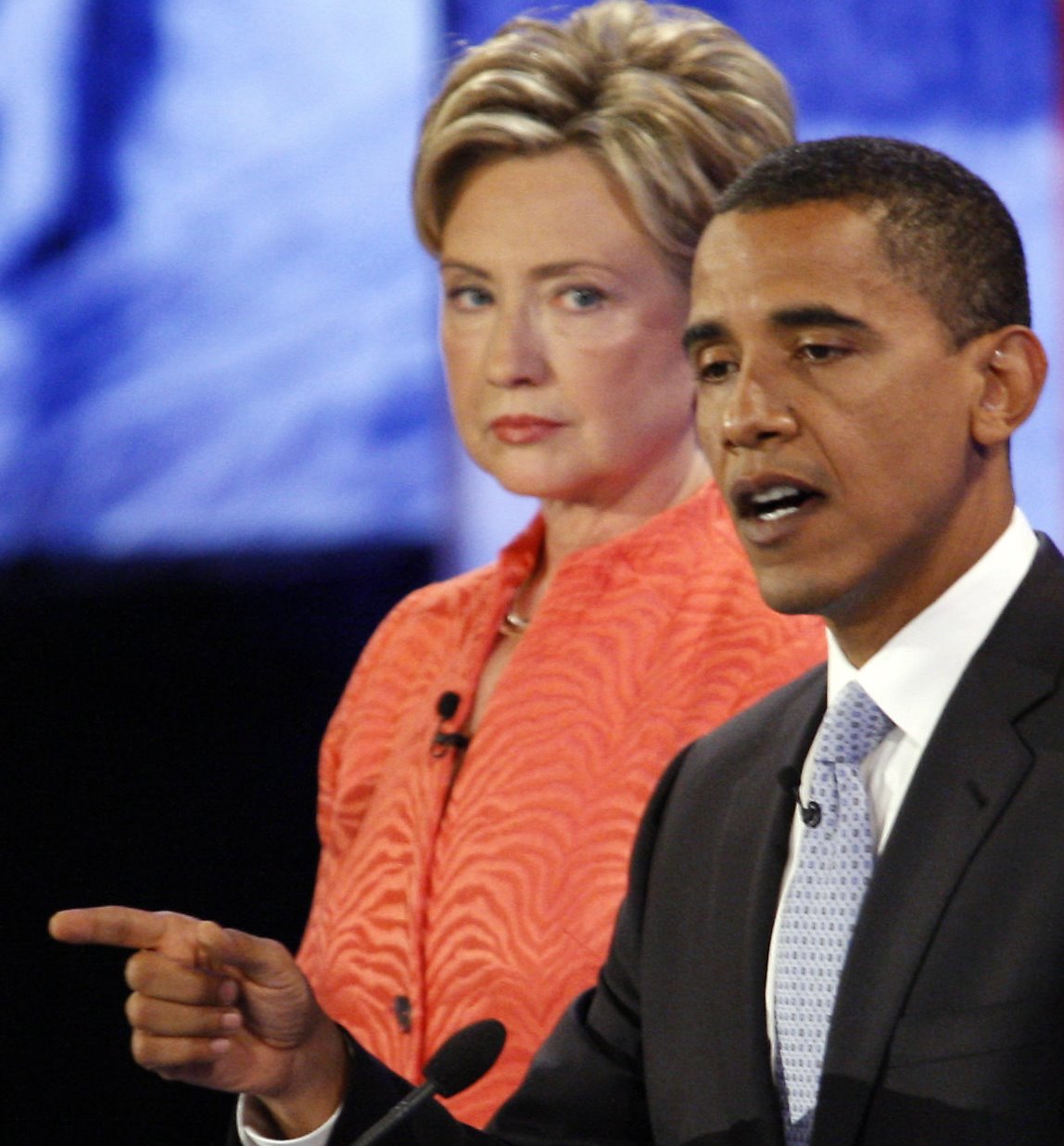
After she accepted secretary of state, they had to craft an effective approach.
They
settled on a dual strategy: engagement and pressure. Compliance with
treaty obligations would result in improved relations. Refusal would
lead to increased isolation and worse.
The first gesture was two
letters from President Obama to the Ayatollah Khameini and a video
message to the people of Iran. The tactic was meant to show our open
hand. Hillary emphasized this posture by inviting Iran to the U.N.
Conference on Afghanistan at The Hague in March 2009. They sent a
deputy foreign minister. Hillary did not meet with him, but
reciprocated by sending a deputy of hers to make contact.
The Hague Afghanistan Conference
April 6, 2009 by still4hill
Hillary's
proxy, Jake Sullivan, hand delivered a letter requesting the release
of three hostages: Robert Levinson, Esha Momeni, and Roxana Saberi.
Levinson remains in custody. Momeni was released in August of that
year, and Roxana Saberi was released in May 2009 and can be seen daily
on Al Jazeera America. Richard Holbrooke also had an encounter with
the Iranian representative that the Iranian later denied. (After all you
have read about Holbrooke in this book, the air of mystery, forever to
remain unsolved, is tantalizing.)
June of that year brought deeply
flawed Iranian elections. The protests and subsequent government
crackdown played out for several weeks, particularly on Twitter. It was
called The Green Revolution.
The mainstream media was perpetually
several days behind. Many of us were busily retweeting tweets from the
streets of Tehran and other Iranian cities. Our profile pictures and
backgrounds were shaded green. This was a wallpaper many of us used.
It was made of a collage of hundreds of our green-shaded profile
pictures. The first night we did this, the whole left side of my
Twitter feed turned to a green stripe within two hours.

These
were visual signals, instantly recognizable, that what followed was
information from Iran. You could scan your feed and rapidly locate the
tweets that could mean everything to someone on the other side of the
globe.
Tweets consisted of life-and-death information. What
hospitals were safe? Which ones had Revolutionary Guards posted? What
streets were safe to navigate? Which embassies were accepting people?
Which were not? Which had Revolutionary Guards stationed at entrances?
We had all set our Twitter accounts to Tehran time and deleted every RT
as soon as we sent it to protect the original senders. The senders did
the same thing in case their phones were confiscated. Continually
retweeting the information was the only way to keep it alive, available,
and moving.
We did this particularly on Friday and Saturday
nights - frantically. It was like a part-time job. We all saw almost
immediately when this young woman, Neda Soltani, was killed in the
street. She died in her father's arms. and her sister tweeted the
horrific video she had posted on Facebook with the heartbreaking words.
"I saw my sister die today." The video at this link is no longer
available in this country, but Hillary writes of this and knew about it.
It had been on Twitter and Facebook for three days before the mainstream media finally picked up the story.
Neda Soltani
June 21, 2009 by still4hill | Edit
I have no words. Yesterday I watched as this lovely young woman, looking for a better life in her own country was killed on the street. I know I was not alone, and I also know I was not the only one who cried.
We
all know by now what Hillary relates in the book - that smack in the
middle of this revolution and all of this activity on Twitter, the
social media site was to go down for maintenance. Her department
prevailed upon Twitter to delay the maintenance in order to leave the
lines of communication open. It was crucial, and even though we who
were retweeting did not and do not know what night that was to have been
and what terrible things were happening just then, I know we were
still there retweeting critical information back to Iran because Hillary made sure we could.
We don't know how many lives might have been saved as a result. We never knew. I think we did help. I pray we did.
Hillary
says in the book that she remains uncertain that staying on the
sidelines was our best move during that terrible time as this popular
uprising was crushed.
She writes that by September Khameini and
Ahmedinejad, the quirkily comic yet dangerous President (who reminded
some of us of a certain Twin Peaks character) had solidified
their stronghold and UNGA was imminent. President Obama was scheduled
to chair a Security Council meeting on nuclear security, and recent
news of a secret enrichment facility near Qom was an issue to be
provided some international daylight.
Hillary foreshadowed what was to be unveiled in this speech about a week earlier.
Hillary Clinton at Brookings Institution in Advance of UN General Assembly
September 18, 2009 by still4hill
... let me take a moment to say a few words about Iran, which will be another key topic on the President’s and my agenda next week.
To begin, it is important to recall what’s really at issue, and what’s really at stake.
Iran has refused for years to address the international community’s deep concerns about its nuclear program. Those concerns have been underscored repeatedly by the International Atomic Energy Agency and the UN Security Council.
Iran’s continued failure to live up to its obligations carries profound consequences – for the security of the United States and our allies; for progress on global nonproliferation and progress toward disarmament; for the credibility of the IAEA and the Security Council and the Nonproliferation Treaty; and of course, for stability in the Persian Gulf, the Middle East, and beyond.
Our concern is not Iran’s right to develop peaceful nuclear energy, but its responsibility to demonstrate that its program is intended exclusively for peaceful purposes. This is not hard to do. Iran’s continued refusal to cooperate has damaged the credibility of its claim that it does not seek a nuclear weapon.
So Iran faces a choice. The international community has made abundantly clear what is possible for all Iranians if Iran lives up to its responsibilities on the nuclear issue – the benefits of economic connections to the rest of the world, cooperation on peaceful nuclear energy, and partnership in education and science.
But there will be accompanying costs for Iran’s continued defiance – more isolation and economic pressure, less possibility of progress for the people of Iran.
Outing the Qom facility in the Security Council was ditched. The alternative was to use private meetings.
The Russians were visibly shocked. Here is how it began to roll out.
Video: Secretary Clinton’s Remarks on Iran
September 24, 2009 by still4hill
Secretary Clinton: Further Remarks on Iran
September 26, 2009 by still4hill
... as President Obama, President Sarkozy, and Minister Brown said in their statement today, Iran’s efforts over a number of years to build a covert enrichment facility near Qom deepens our already deep concern, and the growing international understanding about the scope and intent of Iran’s nuclear program...
This is further evidence of Iran’s continued defiance of IAEA and the United Nations obligations. Iran is breaking rules that all nations are expected to follow, and we fully support an immediate IAEA investigation...
This is an unfolding narrative. As more and more information is shared with the world, as the comments made by Ahmadinejad during his recent appearance, and both before and since illustrate attitudes and approaches that are really at variance with almost universal principles and understanding of historical reality...
I’m not going to prejudge it, but clearly, this is an incredibly important disclosure that the world needs to digest.
The "Geneva Agreement" became the effort into the fall.
Hillary Clinton and Robert Gates: Power and Persuasion
October 6, 2009 by still4hill
... there were three agreements. One, that there would be inspections, and those inspections are going forward and they’re going forward quickly, of the undisclosed site that the President and Prime Minister Brown and President Sarkozy announced a little over a week ago in Pittsburgh. They agreed that, in principle, the Iranians would ship out their LEU for reprocessing to be returned for their research reactor. There will be a team of experts meeting to determine exactly how that will be carried out within 10 days. And they agreed that there will be another meeting, which means that this process doesn’t just drag on without any continuity.
So we think that on those three big issues, this was a worthwhile meeting. But as the President has said and I and others have also made clear, this is not by any means a stopping point. There is much more to be done. We expect much more.
Hillary Clinton in England with David Miliband
October 11, 2009 by still4hill
... we have also reviewed our position on Iran, where our countries work so closely together, including on the most recent revelation of the covert Iranian uranium enrichment site. My point on this is very, very simple, that Iran will never have a better opportunity to establish normal relations with the international community. And it will never have a better opportunity than to show that the peaceful intent that marks its words about its nuclear program is matched by its deeds.
Hillary Clinton with Sergei Lavrov in Moscow
October 14, 2009 by still4hill
We obviously discussed some of the broader foreign policy issues that we both face. Iran’s nuclear program remains a matter of serious concern, and we’re working closely with Russia through the P-5+1 process. We had a constructive meeting in Geneva on October 1st. And we are working to ensure that Iran moves forward with us on this engagement track and demonstrates unequivocally that it is seeking only the peaceful use of nuclear weapons.
We had a long discussion and brought in some of our technical experts to review where we stand on missile defense. We explained that our assessment of the evolving threat from Iran led President Obama to adopt a new, different approach to missile defense. We are very interested in working with Russia to develop cooperation, including a joint threat assessment and intensified efforts to establish a joint data exchange center, as our presidents agreed to in July, as a means of making missile defense a common enterprise against what we believe are increasingly common threats.
Secretary Clinton: Back at Foggy Bottom after an extended trip
November 6, 2009 by still4hill
The United States is also grateful for Germany’s participation and leadership in the P-5+1 and the E-3+3 processes to ensure Iran’s full compliance with UN Security Council resolutions and IAEA directives on its nuclear program. We are speaking with one voice on this critical issue, and it is a voice that is amplified by our friends from Britain and France, from Russia, China and the European Union. We are pressing Iran together in our support of the recent proposal to provide new fuel for the Tehran research reactor in exchange for Iran shipping out its low-enriched uranium. We both support the IAEA’s efforts to inspect the recently disclosed uranium enrichment facility near Qom. And we both remain ready, along with our partners, to meet with Iranian representatives to discuss further steps to build confidence and transparency in its nuclear program. As I have said, this is a pivotal moment for Iran, and we urge Iran to accept the agreement as proposed. We will not alter it, and we will not wait forever.
Hillary Clinton’s Remarks with French Foreign Minister Kouchner
January 30, 2010 by still4hill |
The work on Iran is (inaudible) greater intensity and France’s leadership is especially important. The international community is united in its resolve regarding Iran’s nuclear program and in its condemnation of the serious escalating assault on human rights. The recent executions that have taken place in Iran of demonstrators, the creation of new crimes to try to imprison and execute protestors and opposition leaders is deplorable.
Video & Text: Secretary Clinton’s Remarks Before Senate Foreign Relations Committee
February 24, 2010 by still4hill
We are fighting two wars that call on the skill and sacrifice of our civilians as well as our troops. We have pursued a dual-track approach to Iran that has exposed its refusal to live up to its responsibilities and helped us achieve a new unity with our international partners. Iran has left the international community with little choice but to impose greater costs for its provocative steps. And we are now working actively with our partners to prepare and implement new measures to pressure Iran to change its course.
Video & Text: Secretary Clinton Before House Foreign Affairs Committee
February 25, 2010 by still4hill |
The figures in the budget are more than numbers on a page. They tell the story of the challenges we face and the resources we need to overcome them. We are fighting two wars that call for the skill and sacrifice of our civilians as well as our troops. We have pursued a dual-track approach to Iran that has exposed for the world to see its refusal to live up to its responsibility, and it has helped us achieve a new unity with our international partners. Iran has left the international community little choice but to impose greater costs for its provocative steps. And we are now working actively with other countries to prepare and implement new measures to pressure Iran to change course.
Brazil was, at the time, occupying one of the rotating seats on the Security Council. Cooperation was essential to the success of the resolution for sanctions.
Secretary Clinton’s Remarks With Brazilian Foreign Minister Celso Luiz Nunes Amorim
March 4, 2010 by still4hill
... both the United States and Brazil are committed to the core goal of nonproliferation. And the foreign minister and I discussed our mutual commitment to ensuring that Iran does not acquire a nuclear weapon. And the United States looks forward to continuing that conversation with Brazil in the weeks ahead.
Secretary Clinton’s Remarks With Russian FM Lavrov
March 18, 2010 by still4hill
We discussed at length Iran’s nuclear program, which remains an issue of grave concern for the international community. We are still committed, as we have been, to a diplomatic solution, but there must be a solution. Iran is not living up to its international obligations and, therefore, we’re working together with our other partners in the P-5+1 to bring together a very clear international consensus in the Security Council that gives Iran the message it needs to hear that its behavior does have consequences and that its pursuit of nuclear weapons poses a direct threat both to regional and global security.
Hillary Rodham Clinton Secretary of State: Remarks at the Review Conference of the Nuclear Nonproliferation Treaty
May 3, 2010 by still4hill
We know there are some countries who will choose not to be constructive. This morning, Iran’s president offered the same tired, false, and sometimes wild accusations against the United States and other parties at this conference. But that’s not surprising. As you all heard this morning, Iran will do whatever it can to divert attention away from its own record and to attempt to evade accountability. Ultimately, however, we will all be judged not for our words but for our actions. And we will all be measured not by how assertively we claim our rights but by how faithfully we uphold our responsibilities. And as the Secretary General said, in this regard the onus is on Iran. So far, it has failed to meet its burden. Iran is the only country represented in this hall that has been found by the IAEA Board of Governors to be currently in noncompliance with its nuclear safeguards obligations – the only one. It has defied the UN Security Council and the IAEA, and placed the future of the nonproliferation regime in jeopardy. And that is why it is facing increasing isolation and pressure from the international community.
Secretary Clinton’s Address at the Strategic and Economic Dialogue Opening Session
May 24, 2010 by still4hill
... on international security challenges, the United States and China have consulted closely on the challenge posed by Iran’s nuclear program. The prospect of a nuclear-armed Iran concerns us all. And to address that threat, together we have pursued a dual-track approach of engagement and pressure, aimed at encouraging Iran’s leaders to change course. The draft resolution agreed to by all of our P-5+1 partners and circulated at the Security Council sends a clear message to the Iranian leadership: Live up to your obligation, or face growing isolation and consequences. As we continue to cooperate in New York, the burden is on Iran to demonstrate through its actions that it will uphold its responsibility.
Secretary Clinton: Concluding Joint Statements at the U.S.-China Strategic and Economic Dialogue
May 25, 2010 by still4hill
... we had very frank and detailed conversations about international security challenges and regional hot spots, including Iran and North Korea. We stressed the importance of reaching a conclusion on resolution of the United Nations Security Council to send a message to Iran to, “Live up to your international responsibilities or face growing isolation and consequences.”
Hillary mentions an OAS
meeting in Peru where she had cocktails with Chinese ambassador the the
U.S. Zhang Yesui and they worked out some fine points on the sanctions
while the press at the bar had no idea high-level negotiations were
going on. Mark Landler of the New York Times brought them a couple of drinks, and there was a final agreement. Thank you Mark!
Assistant Secretary Arturo Valenzuela: Briefing on Secretary Clinton’s Upcoming Travel to Latin America and the Caribbean
June 4, 2010 by still4hill |
This trip this week will begin on Sunday and it’s to Lima, Peru, for the General Assembly of the Organization of American States. So the Secretary will lead the U.S. delegation to the Organization of American States annual meeting in Lima. And in Lima, she will also have a bilateral meeting with President Garcia, who, as you know, was in Washington last week to meet with the President as well.
From – so will be arriving on Sunday in Lima, Peru – Sunday evening. She will spend the entire day in Peru on Monday in the meetings of the OASGA.
Hillary Clinton: Statements and Remarks on the Security Council Vote
June 9, 2010 by still4hill
I commend the United Nations Security Council for its adoption today of UN Security Council Resolution 1929, aimed at addressing the international community’s concerns regarding Iran’s nuclear program. Despite consistent and longstanding demands by the Council, Iran has not suspended its uranium enrichment and other proliferation-related activities that are in direct violation of its commitments to the IAEA and its obligations under the NPT.
This resolution sends an unambiguous signal to Iran that the international community holds it accountable for its actions. The measures in this resolution go well beyond the pre-existing sanctions on Iran.
Secretary Clinton’s Statement on Passage of Iran Sanctions Legislation
June 25, 2010 by still4hill
I join President Obama in welcoming Congressional passage of legislation to strengthen sanctions against Iran. We support the broad aims of HR 2194, the Comprehensive Iran Sanctions, Accountability, and Divestment Act of 2010 — constraining Iran’s nuclear program, changing the calculus of Iran’s leaders, and demonstrating that Iran’s policies decrease its standing, and further isolate it in the international community. We are committed to fully implementing this legislation in a manner that advances our multilateral dual-track strategy of engagement and pressure. These new measures, along with action by the European Union and Australia, build on United Nations Security Council Resolution 1929 and underscore the resolve of the international community to prevent Iran from developing nuclear weapons and to hold it accountable for its international obligations. The United States will work with our partners to maximize the impact of these efforts and to continue pursuing a diplomatic resolution to the international community’s concerns regarding Iran’s nuclear program.
December 2010, she
recounts her first face-to-face encounter with her Iranian counterpart
at this function where she extended her open hand and was twice
rebuffed.
Secretary Clinton’s Remarks at the Manama Dialogue Opening Dinner
December 3, 2010 by still4hill
At this time, I would like to address directly the delegation at this conference from the government of the Islamic Republic of Iran.
I am pleased to have this opportunity for your government and mine to gather here with representatives from other nations to discuss problems of mutual concern and interest...
Nearly two years ago, President Obama extended your government a sincere offer of dialogue. We are still committed to this offer.
The
next month, Sultan Qaboos made his offer to help. He had helped get
the release of three American hikers, Joshua Fattal, Shane Bauer, and
Sarah Shourd who had been arrested in July 2009. This, of course, was
bigger and very sensitive. Complications were sure to arise and they
did.
The news she mentions about the assassination plot against
the Saudi ambassador to the U.S. broke while she was about to be
interviewed at the State Department.
Secretary Clinton’s Interviews with AP and Reuters
October 13, 2011 by still4hill
QUESTION: And that is – presumably you are up to speed, you’re aware of this?
SECRETARY CLINTON: Yes, aware –
QUESTION: And I know that it’s a Justice Department thing and that –
SECRETARY CLINTON: It is.
QUESTION: But what does it say about – I mean, about Iran and any attempt to try and get them to be reasonable?
SECRETARY CLINTON: Well, first let me start with what it says about our whole-of-government efforts. I mean, this was a really important achievement by our law enforcement and our intel community to disrupt this plot. And you’ll be able to get the – you all were up here, but the news conference that the Attorney General and the FBI director and the U.S. Attorney from the Southern District and the Assistant AG for National Security just finished giving made it very clear that this was conceived by and directed by elements within the Iranian Government. The complaint has more detail than that. It’s something that we’ve been aware of and working on, led by the Justice Department and the FBI and the DEA.
So I think that the fact that the plot was disrupted and that, thankfully, the worst consequences that might have resulted from this kind of state-sponsored act of terror against a diplomat who, under the Convention for the Prevention and Punishment of Crimes Against Internationally Protected Persons, is a breach of international norms, and Iran happens to be a signatory to that convention, I think creates a potential for international reaction that will further isolate Iran, that will raise questions about what they’re up to, not only inside the United States or Mexico, but elsewhere in the world. More details will, of course, come out in the course of the case being processed.
But as you may know, Matt, there are two named defendants, one the holder of American and Iranian passports and one who is in Iran who was involved. And I’m going to let the details kind of be up to the Justice Department because it’s really within their bailiwick. But it will not, I think, surprise you to know that we are actively engaged in a very concerted diplomatic outreach to many capitals, to the UN in New York, to not only explain what happened so that we try to preempt any efforts by Iran to be successful in what will be their denial and their efforts to try to deflect responsibility, but that we also enlist more countries in working together against what is becoming a clearer and clearer threat by Iran within many nations.
Secretary Clinton: Measures to Increase Pressure on Iran
November 21, 2011 by still4hill
Recent days have brought new evidence that Iran’s leaders continue to defy their international obligations and violate international norms, including the recent plot to assassinate the Saudi Ambassador here in the United States and as verified by the new report from the International Atomic Energy Agency that further documents Iran’s conduct of activities directly related to the development of nuclear weapons. Now, this report from the IAEA is not the United States or our European partners making accusations; this is the result of an independent review and it reflects the judgment of the international community.

Secretary Clinton with Indian External Affairs Minister S M Krishna
May 8, 2012 by still4hill
MINISTER KRISHNA: Since you asked a specific question about Iran, it remains an important source of oil for us, although its share in our imports are declining, which is well known. Ultimately, it reflects the decision that refineries make based on commercial, financial, and technical considerations. We have discussed our position and our perspectives on energy security, and these discussions will continue. As far as India is concerned, we subscribe to and rigorously implement the UN Security Council resolutions. This issue, however, is not a source of discord between our two countries.
Hillary states that this
was good enough for her. Iran's oil market suffered as our partners
decreased their dependence on that market and migrated to other sources -
often suggested by us. Hillary's mantra of "crippling sanctions" was
becoming realized. She made sure, however, that the people of Iran were
not deprived of necessities as a result, always clarifying that our
argument was with the government, not with the people.
Meanwhile, Iran was propping up Bashar Al-Assad in Syria with weapons, trainers, fighters, and money.
As
Hillary's term at State was drawing to a close, the secret talks began
to yield some results, and Iranian elections were just around the
corner. True debates ensued. Hassan Rouhani was elected. Hillary was
no longer in office when the agreements were reached, and she harbored
(and still does) a healthy skepticism born of experience. Yet five
years of hard work and back-channel negotiations had produced fruit.
Once
again, if anyone tries to disparage or diminish Hillary Clinton's
legacy at the State Department show them this page. Better yet, they
should just read the book. The final few pages of this chapter read as
grippingly as Michael Crichton or John le Carré.
Hillary was not involved in those operations, but it was she who set
the ball rolling. It wasn't a strike, but I think eight pins fell.
__________________________________________________________
Hillary Clinton’s ‘Hard Choices’ Retrospective: Introduction
__________________________________________________________
####


